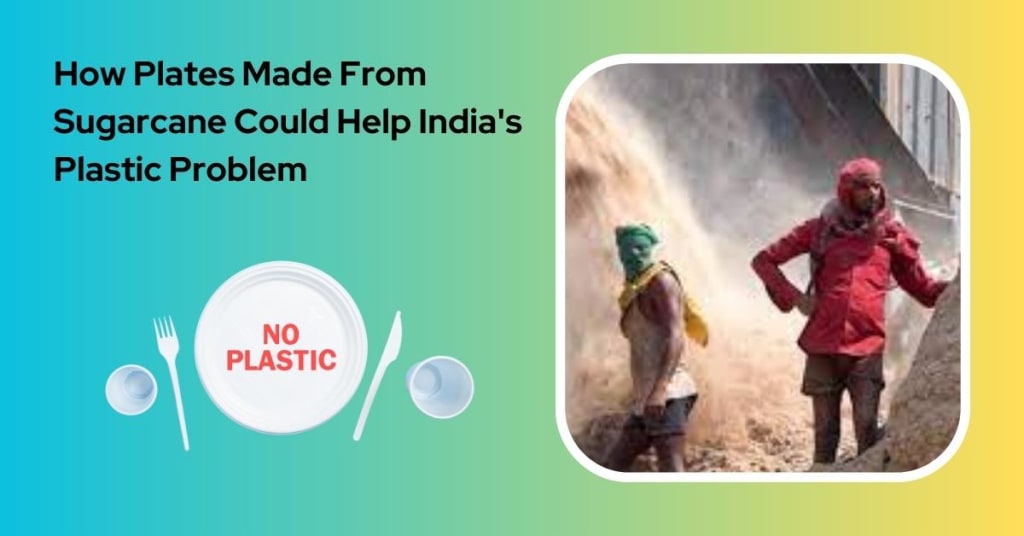How Plates Made From Sugarcane Could Help India's Plastic Problem
Eco-Friendly Sugarcane Plates: Best Alternative for Plastic

India faces a significant environmental challenge due to its massive plastic consumption and the subsequent generation of plastic waste. The detrimental impact of plastic on the environment is well-documented, from pollution of land and water bodies to endangering wildlife. However, a promising alternative has emerged in the form of plates made from sugarcane, offering a sustainable and eco-friendly solution to tackle India's plastic problem. In this article, we will explore the benefits of using sugarcane plates, their production process, and their potential to revolutionize the country's food packaging industry.
The Plastic Crisis in India:
India is among the world's largest consumers of plastic products, and this has led to a dire plastic waste problem. Disposal and recycling of plastic have proven to be significant challenges, resulting in pollution and health hazards. The government and environmentalists have been seeking viable alternatives to reduce plastic consumption and its adverse effects.
Introducing Sugarcane Plates:
Sugarcane plates, also known as bagasse plates, are gaining popularity as a sustainable alternative to traditional plastic or Styrofoam plates. Bagasse is the fibrous leftover residue from sugarcane after the juice extraction process. Plates made from sugarcane are biodegradable, compostable, and pose minimal environmental impact compared to conventional plastic plates.
The Production Process:
The production of sugarcane plates is a relatively simple and eco-friendly process. After sugarcane is harvested and processed for juice extraction, the leftover bagasse is collected. The bagasse is then cleaned, sterilized, and pressed into molds to create a wide range of tableware items, including plates, bowls, and containers. The process utilizes natural and non-toxic materials, making the plates safe for both consumers and the environment.
Advantages of Sugarcane Plates:
Biodegradability and Compostability:
Sugarcane plates break down naturally over time, unlike conventional plastic plates that take hundreds of years to decompose. When disposed of in composting facilities, they quickly degrade, returning to the earth as organic matter and reducing the burden on landfills.
Renewable Resource:
Sugarcane is a renewable resource that can be harvested multiple times a year. As a fast-growing crop, its availability is abundant, making it a sustainable alternative to plastic.
Reduced Carbon Footprint:
The production of sugarcane plates emits significantly fewer greenhouse gases compared to the production of plastic plates. By using bagasse-based products, India can make strides in reducing its carbon footprint and combatting climate change.
Non-toxic and Food Safe:
Sugarcane plates are free from harmful chemicals, making them safe for serving food. Unlike some plastic products, they do not leach toxins into the food, ensuring healthier dining experiences.
Supports Rural Economy:
The production of sugarcane plates has the potential to create employment opportunities, especially in rural areas where sugarcane is cultivated. This can have a positive socio-economic impact by empowering local communities.
Challenges and Considerations:
While sugarcane plates offer a promising solution to India's plastic problem, some challenges need addressing:
Cost:
Currently, sugarcane plates might be more expensive than conventional plastic plates due to factors such as production scale and availability. However, as demand increases and technology improves, the costs are expected to decrease.
Awareness and Infrastructure:
Promoting awareness among consumers and businesses about the benefits of sugarcane plates is essential. Additionally, investing in proper waste management and composting facilities will be crucial to ensure effective disposal and recycling.
Government Initiatives and Industry Support:
To encourage the adoption of sugarcane plates and other eco-friendly alternatives, the Indian government can offer incentives and subsidies to manufacturers. Moreover, collaborations between the public and private sectors can drive innovation and expand the use of sustainable packaging solutions.
Conclusion:
The widespread adoption of plates made from sugarcane can play a pivotal role in addressing India's plastic problem. With their biodegradable nature, minimal environmental impact, and potential for promoting sustainable agriculture and rural development, sugarcane plates represent a compelling solution to reduce plastic waste and create a cleaner and greener India. By making conscious choices and supporting eco-friendly alternatives, we can collectively pave the way towards a more sustainable future.
About the Creator
Raj Kapoor
CEO at Fresh Tableware. We provide eco-friendly Biodegradable Tableware Products In India. Our products are made from biodegradable & compostable materials.






Comments
There are no comments for this story
Be the first to respond and start the conversation.